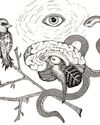
Most of us possess a sense of reality, but what if our senses deceive us? Would I still know what was real if, for instance, I had a microscopic brain tumor that made me hallucinate that the people around me were devils, or that a beautiful sunny day was a dark nightmare? What if I then felt the urge to start shooting people?
Joker, a psychological thriller directed and co-written by Todd Phillips, is a meditation on this disassociative sort of madness. It emphasizes the philosophical problem of the ‘liquid’ divide between perception and reality: if my perception is biased, then my reality transforms as well. A second, connected, problem of madness, is the dissolution of the distinction between inside and outside. I can project my inner being onto the world, changing its color and tone. If I can’t tell that I’m doing this then I’ll live in a labyrinthine inferno, a prison of my own projections. No one can reach out to somebody with this kind of insanity. No one really exists for them, and after a while their own broken mirror reflects no one. The subject devours the world, also disintegrating in the process.
This story is from the {{IssueName}} edition of {{MagazineName}}.
Start your 7-day Magzter GOLD free trial to access thousands of curated premium stories, and 9,000+ magazines and newspapers.
Already a subscriber ? Sign In
This story is from the {{IssueName}} edition of {{MagazineName}}.
Start your 7-day Magzter GOLD free trial to access thousands of curated premium stories, and 9,000+ magazines and newspapers.
Already a subscriber? Sign In

Anselm (1033-1109)
Martin Jenkins recalls the being of the creator of the ontological argument.

Is Brillo Box an Illustration?
Thomas E. Wartenberg uses Warhol's work to illustrate his theory of illustration.

Why is Freedom So Important To Us?
John Shand explains why free will is basic to humanity.

The Funnel of Righteousness
Peter Worley tells us how to be right, righter, rightest.

We're as Smart as the Universe Gets
James Miles argues, among other things, that E.T. will be like Kim Kardashian, and that the real threat of advanced AI has been misunderstood.

Managing the Mind
Roger Haines contemplates how we consciously manage our minds.

lain McGilchrist's Naturalized Metaphysics
Rogério Severo looks at the brain to see the world anew.

Love & Metaphysics
Peter Graarup Westergaard explains why love is never just physical, with the aid of Donald Davidson's anomalous monism.

Mary Leaves Her Room
Nigel Hems asks, does Mary see colours differently outside her room?

From Birds To Brains
Jonathan Moens considers whether emergence can explain minds from brains.